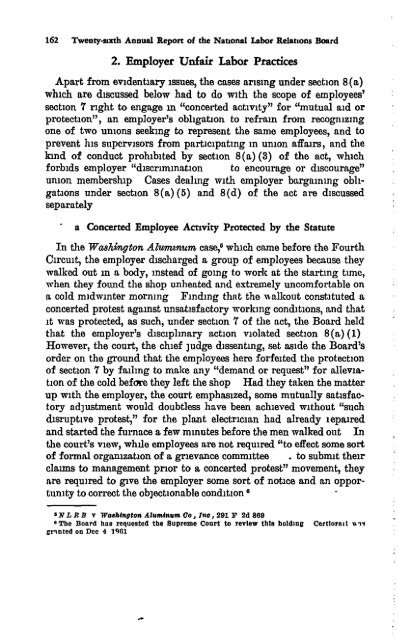TWENTY-SIXTH ANNUAL REPORT - National Labor Relations Board
TWENTY-SIXTH ANNUAL REPORT - National Labor Relations Board
TWENTY-SIXTH ANNUAL REPORT - National Labor Relations Board
Create successful ePaper yourself
Turn your PDF publications into a flip-book with our unique Google optimized e-Paper software.
162 Twenty-sixth Annual Report of the <strong>National</strong> <strong>Labor</strong> <strong>Relations</strong> <strong>Board</strong><br />
2. Employer Unfair <strong>Labor</strong> Practices<br />
Apart from evidentiary issues, the cases arising under section 8(a)<br />
which are discussed below had to do with the scope of employees'<br />
section 7 right to engage in "concerted activity" for "mutual aid or<br />
protection", an employer's obligation to refrain from recognizing<br />
one of two unions seeking to represent the same employees, and to<br />
prevent his supervisors from participating in union affairs, and the<br />
kind of conduct prohibited by section 8(a) (3) of the act, which<br />
forbids employer "discrimination to encourage or discourage"<br />
union membership Cases dealing with employer bargaining obligations<br />
under section 8(a) (5) and 8(d) of the act are discussed<br />
separately<br />
a Concerted Employee Activity Protected by the Statute<br />
In the Washington Alumznum, case,5 which came before the Fourth<br />
Circuit, the employer discharged a group of employees because they<br />
walked out in a body, instead of going to work at the starting time,<br />
when they found the shop unheated and extremely uncomfortable on<br />
a cold midwinter morning Finding that the nalkout constituted a<br />
concerted protest against unsatisfactory working conditions, and that<br />
it was protected, as such, under section 7 of the act, the <strong>Board</strong> held<br />
that the employer's disciplinary action violated section 8(a) (1)<br />
However, the court, the chief judge dissenting, set aside the <strong>Board</strong>'s<br />
order on the ground that the employees here forfeited the protection<br />
of section 7 by failing to make any "demand or request" for alleviation<br />
of the cold before they left the shop Had they taken the matter<br />
up with the employer, the court emphasized, some mutually satisfactory<br />
adjustment would doubtless have been achieved without "such<br />
disruptive protest," for the plant electrician had already iepaired<br />
and started the furnace a few minutes before the men walked out In<br />
the court's view, while employees are not required "to effect some sort<br />
of formal organization of a grievance committee . to submit their<br />
claims to management prior to a concerted protest" movement, they<br />
are required to give the employer some sort of notice and an opportunity<br />
to correct the objectionable condition<br />
5 NLRB v Worthington Aluminum Co, Ino , 291 P 2d 869<br />
The <strong>Board</strong> has requested the Supreme Court to review this holding Certiorail a /9<br />
grinted on Dec 4 1961

















